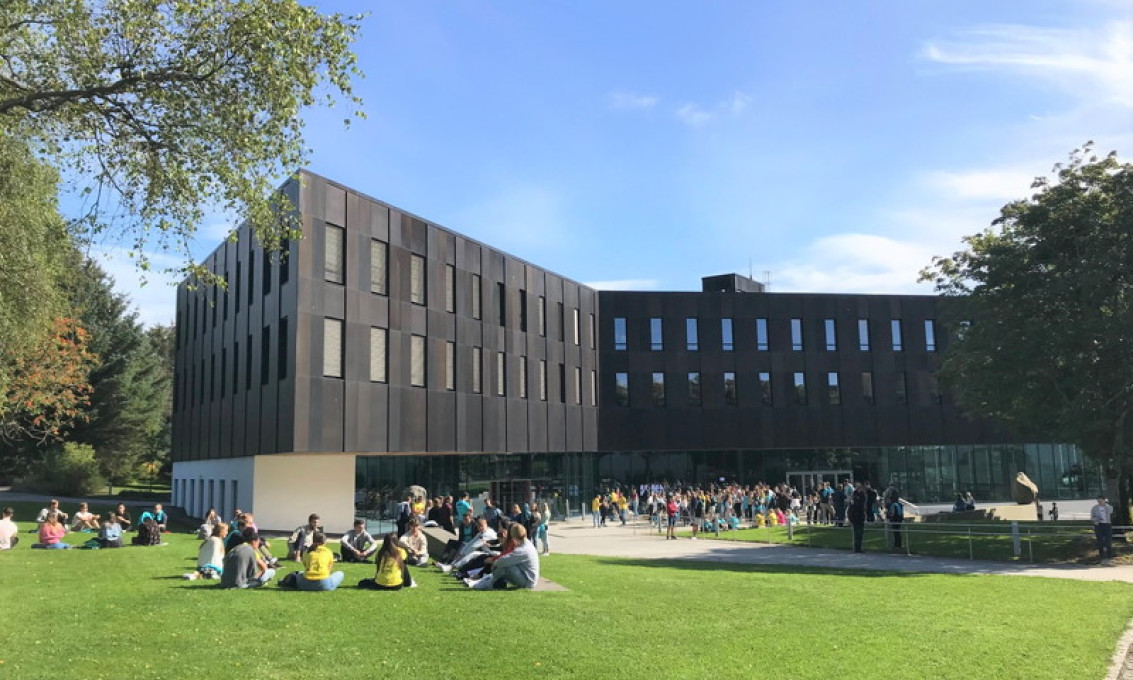Do you want to shape how firms, regions, and societies adapt to economic and technological change? This master’s programme provides you with the skills and knowledge needed to understand, navigate, and lead change in a rapidly evolving economy.
2 years / 4 semesters
English
120 ECTS
Full-time On-campus

About the programme
This programme combines economics, management, and public policy to address the challenges of economic transformation. You will build a solid academic foundation, gain practical experience, and benefit from international perspectives.
The curriculum explores how industries and regions adapt to sustainable solutions, with the Stavanger region serving as an especially relevant case study. The region’s unique challenges and key role in Norway’s economic transition make it a valuable context for analysis.
You will study topics such as innovation, sustainability, regional development, and applied social science methods. In the third semester, you can customise your learning through internships, international exchange, or specialised study tracks. The programme concludes with a master’s thesis or a capstone project, enabling you to apply your skills to real-world economic and societal challenges.
You’ll learn from leading scholars and engage in real-world projects that prepare you for careers in business, government, consulting, or policy research organisations.
Non-EU applicants: 15 Nov to 1 Dec EU applicants: 1 Feb to 1 March Local applicants: 1 Feb to 15 April More information about deadlines
No tuition fee for Norwegian and EU/EEA/Swiss applicants Tuition fee for Non EU applicants
Knowledge and Skills
Graduates will gain:
- Advanced knowledge of economic transformation, sustainability, and innovation.
- Skills in data analysis, strategy design, and policy development.
- The ability to lead organisational and societal change responsibly.
- Competence in interdisciplinary collaboration across business, government, and civil society.

Stavanger
The Stavanger region is rapidly transitioning from oil and gas to new sustainable industries, creating a living laboratory where students engage with policymakers, companies, and innovation hubs.
This dynamic environment makes Stavanger and the UiS School of Business and Law an excellent place to study transformation and innovation.
Strong industry and public-sector collaboration
Practice-oriented learning through cases and internships.
Research excellence at the Centre for Innovation Research
International and vibrant city surrounded by diverse and beautiful nature.

Career & further studies
Graduates will be prepared for careers in:
- Public sector: Ministries, municipalities, county councils, development agencies.
- Private sector: Sustainability management, innovation management, consulting.
- Third sector: Clusters, incubators, chambers of commerce, NGOs.
- Academia & research: Doctoral studies in innovation, sustainability transitions, or economic geography.
Programme Structure
Year 1
Semester 1: Bootcamp, MSB305 Economic Development and Innovation, MSB335 Policies for Transformation, MSB103 Data Analytics
Semester 2: MSB340 Sustainability Transition and Innovation, MSB416 Applied Innovation Management + elective
Year 2
Semester 3: Internship (30 ECTS), international exchange, or electives (e.g., AI and Society, Sustainable Entrepreneurship, Green Transition, etc.)
Semester 4: Master’s Thesis or Capstone Project (30 ECTS)
Study Plan
The two-year programme (120 ECTS) combines compulsory courses, electives, and practical experience, with opportunities for specialisation through electives, internships, or exchange, and concludes with a Master’s thesis or Capstone project.
Year 1 – Semester 1 (Autumn)
- Bootcamp: Introduction to Economics and Business (0 ECTS)
- MSB305 Economic Development and Innovation (10 ECTS)
- MSB335 Policies for Transformation (10 ECTS)
- MSB103 Data Analytics (10 ECTS)
Year 1 – Semester 2 (Spring)
- MSB340 Sustainability Transition and Innovation (10 ECTS)
- MSB416 Applied Innovation Management (10 ECTS)
- Elective (choose 1, 10 ECTS):
- MSB200 Management and Human Resources
- MSB203 Management and Organisational Change
- MEE200 Geopolitics of the Energy Transition
- MEE210 Governing Energy Transitions
Year 2 – Semester 3 (Autumn)
Choose one of three options (30 ECTS):
- Internship (30 ECTS)
- International exchange (30 ECTS)
- Electives (choose 3, 30 ECTS total):
- MSB415 Sustainable Entrepreneurship
- IND650 Innovation Management and Entrepreneurship
- IND570 Green Transition
- DIG501 AI and Society
- SAM550 Energy, Societal Safety and Sustainable Development
- BYG655 Sustainable Urban Development
- MSB325 Sustainable Business Practices
- MSB255 Supply Chain and Operations Management
- HIS352 Key Issues in Environmental History
Year 2 – Semester 4 (Spring)
- Master’s thesis or Capstone project (30 ECTS)
Learning Outcome
A candidate who has completed and passed the programme shall have the following learning outcomes:
Knowledge
- Has an advanced understanding of how economies evolve and transform through innovation, entrepreneurship, and institutional change, with particular attention to sustainability and spatial dynamics.
- Has deep insight into systems thinking, complexity, and evolutionary perspectives on economic development, including an understanding of transformations as multi-level, path-dependent, and contested processes.
- Has thorough knowledge of the tools and limits of innovation and transformation policy, including how different governance levels (local, regional, national, EU/international) design and justify interventions under uncertainty and political pressure.
- Has an advanced understanding of the theoretical and practical challenges of leading organizational and societal change, including managing innovation processes within and across firms, public agencies, and civil society actors.
- Has advanced knowledge of the strengths and weaknesses of quantitative methods in economic transformation and innovation research and knows how to use programming tools to analyze, visualize, and present data for decision-making.
Skills
- Can analyze complex transformation challenges using multi-theoretical lenses, from institutional economics and innovation systems to transition studies and economic geography.
- Can use data independently as a critical tool, applying and interpreting statistical models to generate insights about firm behaviour, spatial development, or sustainability outcomes.
- Can design transformative strategies and policies in an independent manner, offering empirically grounded recommendations for firms, public agencies, and communities navigating structural change.
- Can move between academic and applied contexts, translating theoretical knowledge into actionable ideas for innovation management, regional transformation, and sustainability entrepreneurship.
- Can critically assess the ethical, organizational, and social dimensions of innovation and change, and act responsibly in settings that require collaboration, reflexivity, and leadership under uncertainty.
- Can carry out an independent research project on economic transformation and innovation under supervision and in accordance with applicable norms for research ethics.
General Competence
- Can apply systems thinking and strategic analysis to complex transformation problems involving economic, social, environmental, and technological dynamics.
- Can engage constructively across disciplinary and professional boundaries, using the vocabulary of both business and social sciences to facilitate dialogue between firms, policymakers, and civil society and contribute to new thinking and innovation processes.
- Can demonstrate a reflective and critical mindset to communicate extensive independent work about growth, innovation, and transformation to specialists and the general public, using the language and terminology of the field.
- Can navigate ethical tensions and dilemmas in transformation contexts, such as balancing short-term competitiveness with long-term sustainability, or managing inclusive innovation under resource constraints.
- Can collaborate effectively in diverse teams, contributing to shared learning processes, co-creation, and mutual capacity-building in problem-based and real-world-oriented settings.
Admission Requirements
Admission is based on academic background, research methods training, and minimum grade requirements.
- Bachelor’s degree (minimum 180 ECTS) in social sciences or humanities
- Minimum 7,5 ECTS in research methods.
- Minimum grade average C on the ECTS scale.
Admission
Contact
For inquiries regarding admission to international Master's programmes, send an email to: admissions@uis.no
Student exchange
By going on exchange to one of our partner institutions abroad as part of your studies, you will have an opportunity to get a unique education. In addition to improving your career opportunities, you grow as a person and gain the ability to greater reflect on the topics you study as part of your degree.
Utveksling
Våre studenter forventes å tilbringe deler av studietiden i utlandet ved en institusjon i utlandet. Utenlandsoppholdet kan legges til 5. og/eller 6. semester. Dette vil gi deg nyttig og ettertraktet internasjonal erfaring og slik styrke dine muligheter når du skal ut i arbeidslivet. Handelshøgskolen har avtaler med en rekke institusjoner i Europa og resten av verden, så mulighetene for et flott utenlandsopphold er mange og gode. Flere av våre utvekslingsavtaler er tilknyttet stipendprogram, og alle kvalifiserer til støtte fra Statens lånekasse. Mange av våre internasjonale partnere tilbyr fagsammensetninger vi ikke selv har ved UiS, og mange legger også til rette for at studiene kan kombineres med praksisopphold i lokale virksomheter.
Studenter som søker studieopphold i utlandet, må ha fullført normert studieplan.
Valg av emner
I hvert av utvekslingsemestrene er det satt opp 30 studiepoeng valgemner.. Det vil si at du står fritt til å velge hvilke emner du vil ta i utlandet. Et utvekslingsopphold er en god mulighet til å studere fag som ikke tilbys ved UiS. Emnene må være på riktig nivå for din progresjon i studiene, og ikke overlappe med emner du alt har tatt eller skal ta senere.
Det er viktig at du søker om forhåndsgodkjenning av emnene du skal ta i utlandet. Dette må du gjøres i god tid før avreise. Handelshøgskolen vil invitere til en workshop der vi informerer mer om valg av og godkjenning av emner.
Kontaktperson
Veiledning og forhåndsgodkjenning av emner:
Studiekonsulent Anette Hansen på anette.hansen@uis.no
Generelle spørsmål om utveksling: Utvekslingsveilederen i Digital studentekspedisjon
See where you can travel
Australia
Central Queensland University
Australia
Griffith University
Australia
Queensland University of Technology
Australia
The University of Western Australia
Belgia
University of Leuven
Canada
Memorial University of Newfoundland
Canada
Nipissing University
Danmark
Aalborg Universitet
Frankrike
Catholic University of Lille
Frankrike
EDC Paris Business School
Frankrike
NEOMA Business School
Frankrike
Rennes School of Business
Frankrike
University Savoie Mont Blanc
Italia
University of Venice Ca' Foscari
Mexico
Monterrey Institute of Technology University System
Nederland
University of Twente, Enschede
New Zealand
University of Otago
Polen
Kozminski University
Portugal
ISCTE - Instituto Universitário de Lisboa
Spania
Autonomous University of Barcelona
Storbritannia og Nord-Irland
University of the West of Scotland
Tyskland
SRH University Berlin
Tyskland
University of Münster
USA
California State University Monterey Bay
USA
Gettysburg College
USA
State University of New York College at Brockport
USA
University of California, Berkeley
USA
University of North Dakota
USA
University of Wisconsin-Madison
Østerrike
University of Graz
Contact
Fakultetsadministrasjonen HH-UIS
Department of Innovation, Management and Marketing

